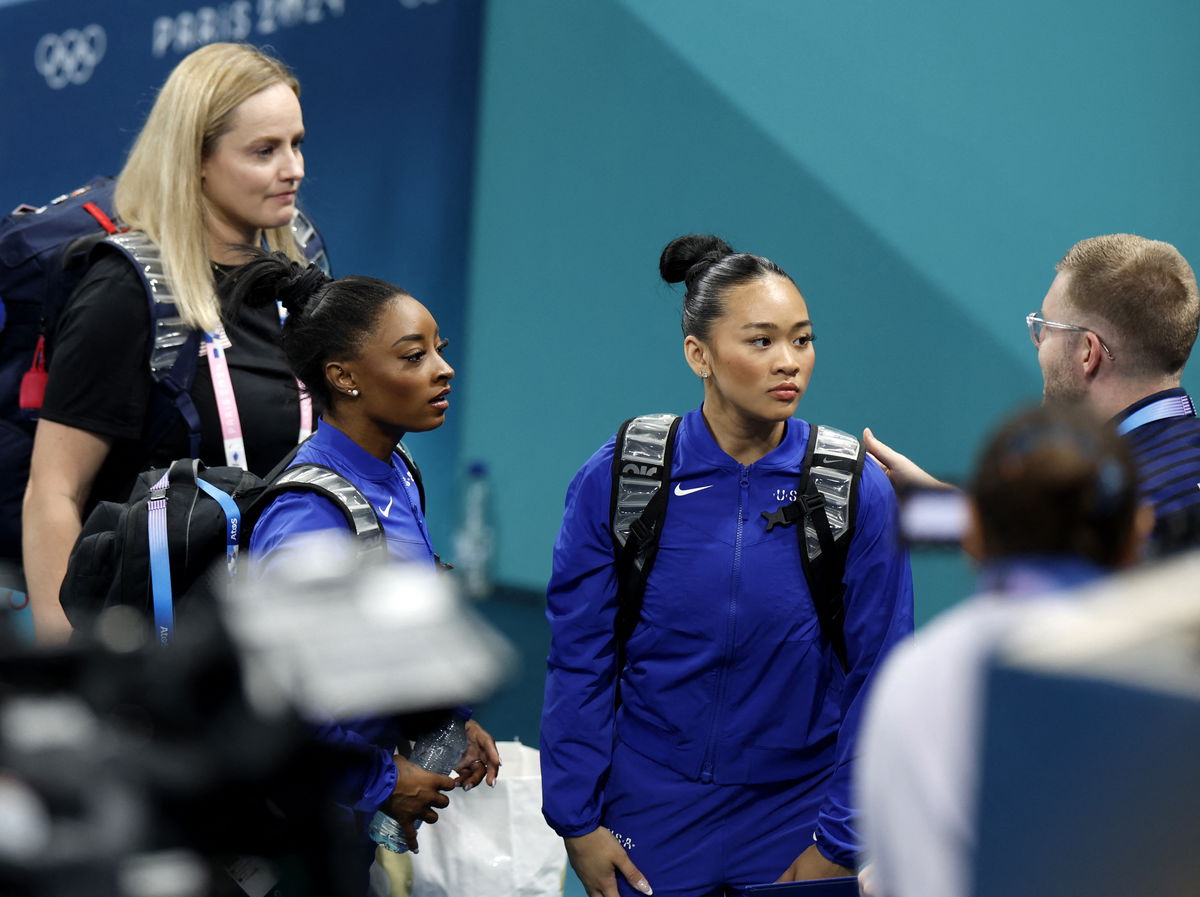Aug 1, 2025 | 12:21 AM EDT

Reuters
Paris 2024 Olympics – Artistic Gymnastics – Women’s Balance Beam Final – Bercy Arena, Paris, France – August 05, 2024. Simone Biles of United States leaves the arena with Sunisa Lee of United States. REUTERS/Peter Cziborra

Reuters
Paris 2024 Olympics – Artistic Gymnastics – Women’s Balance Beam Final – Bercy Arena, Paris, France – August 05, 2024. Simone Biles of United States leaves the arena with Sunisa Lee of United States. REUTERS/Peter Cziborra

Reuters
Paris 2024 Olympics – Artistic Gymnastics – Women’s Balance Beam Final – Bercy Arena, Paris, France – August 05, 2024. Simone Biles of United States leaves the arena with Sunisa Lee of United States. REUTERS/Peter Cziborra

Reuters
Paris 2024 Olympics – Artistic Gymnastics – Women’s Balance Beam Final – Bercy Arena, Paris, France – August 05, 2024. Simone Biles of United States leaves the arena with Sunisa Lee of United States. REUTERS/Peter Cziborra
A familiar face returned to the Olympic all-around podium in Paris. But it was not only athletic preparation or recovered health that carried her there. It was something quieter, said off-camera. Offered not by a coach, nor a medical expert, but by the one gymnast who knew better than anyone what it means to carry weight beyond medals. Simone Biles, once again, shifted the course of Suni Lee’s career. This time, not with a vault or beam routine, but with a sentence.
Watch What’s Trending Now!
Suni Lee arrived in Paris as both champion and underdog. In 2021, her Olympic gold in Tokyo had surprised the gymnastics world, coming in the wake of Simone Biles’ withdrawal. But Paris presented a very different challenge. Lee’s preparation had been interrupted not by injury in the usual sense, but by illness. Specifically, a kidney-related condition that not only halted her NCAA career at Auburn, but at one point cast doubt over whether she would compete again at all. But one person stood firm and made Lee believe in herself when she did not have the grit. It was none other than Simone Biles.
The most consequential moment in Lee’s return to Olympic form did not take place in a gym or treatment center. It happened in a conversation with Biles, whose own history at the Games is inseparable from Lee’s rise. “Simone was like, ‘You need to realise who you are! You won this gold medal because you are an amazing athlete!'” Lee recalled in an interview with Olympics.com. “‘You need to stand on that and believe in that and go out there and compete and act like it.’ That was probably one of the best pieces of advice that I’ve ever gotten,” Lee further recalled how Biles inspired her.
Her bronze in the Paris all-around final not only placed her among the world’s best again. It placed her in rare company. No reigning Olympic all-around champion had returned to the podium at the following Games since Nadia Comaneci, who did it in 1976 and again in 1980. In Paris, Lee delivered a composed, tactically smart performance. Her beam was clean. Her floor held together with focus rather than flair. It was not the highest difficulty in the field, but it was enough, more than enough, to stand beside two new names and still belong.

Reuters
Credit: REUTERS
Source: REUTERS
Looking back, Lee was quick to name the difference. It wasn’t simply the right routine composition or a fortunate draw. It was a belief, loaned to her by someone who had nothing to prove. Victory, it turns out, sometimes begins in the words of someone who’s been there before. However, before coming to Paris, Suni Lee had to undergo a strict routine to regain her strength.
How Suni Lee reclaimed her strength after rare kidney disease diagnosis
In the span of a year, Sunisa Lee moved from Olympic champion to an uncertain future shaped by an unrelenting medical diagnosis. What began as unexplained swelling turned into an inescapable reality: not one, but two rare kidney diseases. These conditions, while invisible to most, altered the very foundation of her athletic identity. “I have kidney disease. Two rare kidney diseases,” she later revealed, in what marked a turning point not only in her career, but in her understanding of resilience.
Her return to gymnastics was neither swift nor assured. With her weight unpredictably fluctuating due to water retention, and her body no longer responding with the consistency she once relied upon, she and her coaches had to reconstruct everything from technique to routine pacing. “I had to relearn everything,” she explained, “and my coaches had to relearn how to coach me.” This was not a comeback built on nostalgia or blind ambition. It was a meticulous negotiation between capacity and ambition, between what once came easily and what now required near-monastic discipline.

Reuters
Paris 2024 Olympics – Artistic Gymnastics – Women’s Balance Beam Final – Bercy Arena, Paris, France – August 05, 2024. Sunisa Lee of United States looks on. REUTERS/Amanda Perobelli
Her internal struggle, however, was often more punishing than the physical toll. “There were days when I was so frustrated that my body couldn’t do what it used to that I’d leave the gym in anger, determined to quit.” The emotional solitude of this battle was compounded by her refusal to accept pity or lowered expectations. She wanted no allowances. No disclaimers. Only the chance to prove that even diminished, she retained the core of what had made her an Olympian in the first place.
And in the end, she did. The Olympic Trials served not merely as a test of skill, but of will. “I clawed my way back with everything I had,” she said, and in Paris, when she returned to the podium with three more medals, the moment held far more than symbolic weight. It was not a return to who she had been, but a quiet arrival at someone stronger, someone newly made by adversity, not undone by it.


